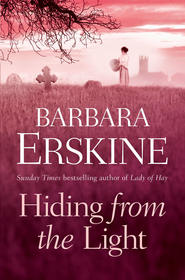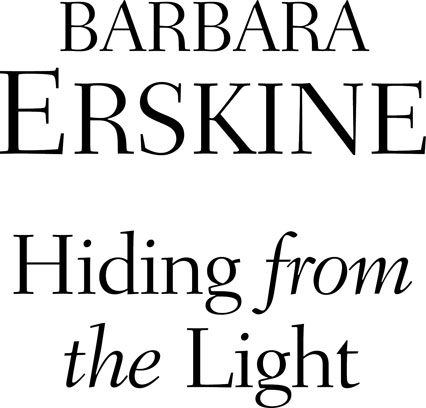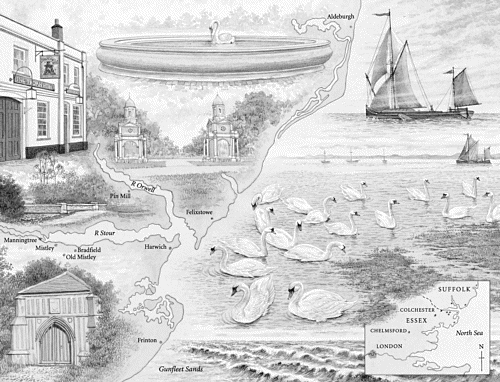
Полная версия:
Hiding From the Light



Copyright
Published by HarperCollinsPublishers Ltd 1 London Bridge Street London SE1 9GF
www.harpercollins.co.uk
First published in Great Britain by HarperCollinsPublishers 1998 This edition published by HarperCollinsPublishers 2016
Copyright © Barbara Erskine 1998
Maps and chapter head illustrations by Rex Nicholls
Cover layout design © HarperCollinsPublishers Ltd 2016
Cover photographs © Gary Ombler/Getty Images (woman); Stuart Brill/Trevillion Images (chapel with mist); John James/Alamy (grave stone)
Barbara Erskine asserts the moral right to be identified as the author of this work.
A catalogue copy of this book is available from the British Library.
This novel is entirely a work of fiction. The names, characters and incidents portrayed in it are the work of the author’s imagination. Any resemblance to actual persons, living or dead, events or localities is entirely coincidental.
All rights reserved under International and Pan-American Copyright Conventions. By payment of the required fees, you have been granted the non-exclusive, non-transferable right to access and read the text of this e-book on screen. No part of this text may be reproduced, transmitted, down-loaded, decompiled, reverse engineered, or stored in or introduced into any information storage and retrieval system, in any form or by any means, whether electronic or mechanical, now known or hereinafter invented, without the express written permission of HarperCollins.
Source ISBN: 9780007288632
Ebook Edition © March 2016 ISBN: 9780007320974
Version: 2017-09-08
Epigraph
Lighten our darkness, we beseech thee, O Lord; and by thy great mercy defend us from all perils and dangers of this night; for the love of thy only son, our Saviour, Jesus Christ.
The Book of Common Prayer
He who has once seen a ghost is never again as though he had not seen a ghost.
Cardinal John Henry Newman, 1870
God is light, and in him is no darkness at all.
I John 1,5
Contents
Cover
Title Page
Copyright
Epigraph
Map
Note
Part One
Chapter One: The Present Day
Chapter Two
Chapter Three
Chapter Four
Chapter Five
Chapter Six
Chapter Seven
Chapter Eight
Chapter Nine
Chapter Ten
Chapter Eleven
Chapter Twelve
Chapter Thirteen
Chapter Fourteen
Chapter Fifteen
Chapter Sixteen
Chapter Seventeen
Chapter Eighteen
Chapter Nineteen
Part Two
Chapter Twenty
Chapter Twenty One
Chapter Twenty Two
Chapter Twenty Three
Chapter Twenty Four
Chapter Twenty Five
Chapter Twenty Six
Chapter Twenty Seven
Chapter Twenty Eight
Chapter Twenty Nine
Chapter Thirty
Chapter Thirty One
Chapter Thirty Two
Chapter Thirty Three
Chapter Thirty Four
Chapter Thirty Five
Chapter Thirty Six
Chapter Thirty Seven
Chapter Thirty Eight
Chapter Thirty Nine
Chapter Forty
Chapter Forty One
Chapter Forty Two
Chapter Forty Three
Chapter Forty Four
Chapter Forty Five
Chapter Forty Six
Chapter Forty Seven
Chapter Forty Eight
Chapter Forty Nine
Chapter Fifty
Chapter Fifty One
Chapter Fifty Two
Chapter Fifty Three
Chapter Fifty Four
Chapter Fifty Five
Chapter Fifty Six
Chapter Fifty Seven
Chapter Fifty Eight
Chapter Fifty Nine
Chapter Sixty
Chapter Sixty One
Chapter Sixty Two
Chapter Sixty Three
Chapter Sixty Four
Chapter Sixty Five
Chapter Sixty Six
Chapter Sixty Seven
Chapter Sixty Eight
Chapter Sixty Nine
Chapter Seventy
Chapter Seventy One
Chapter Seventy Two
Chapter Seventy Three
Chapter Seventy Four
Chapter Seventy Five
Chapter Seventy Six
Chapter Seventy Seven
Chapter Seventy Eight
Chapter Seventy Nine
Chapter Eighty
Chapter Eighty One
Chapter Eighty Two
Chapter Eighty Three
Chapter Eighty Four
Chapter Eighty Five
Chapter Eighty Six
Chapter Eighty Seven
Chapter Eighty Eight
Chapter Eighty Nine
Chapter Ninety
Chapter Ninety One
Chapter Ninety Two
Chapter Ninety Three
Chapter Ninety Four
Chapter Ninety Five
Chapter Ninety Six
Chapter Ninety Seven
Chapter Ninety Eight
Chapter Ninety Nine
Chapter Hundred
Chapter Hundred and One
Chapter Hundred and Two
Chapter Hundred and Three
Chapter Hundred and Four
Chapter Hundred and Five
Chapter Hundred and Six
Chapter Hundred and Seven
Chapter Hundred and Eight
Chapter Hundred and Nine
Chapter Hundred and Ten
Chapter Hundred and Eleven
Chapter Hundred and Twelve
Chapter Hundred and Thirteen
Chapter Hundred and Fourteen
Chapter Hundred and Fifteen
Chapter Hundred and Sixteen
Chapter Hundred and Seventeen
Chapter Hundred and Eighteen
Chapter Hundred and Nineteen
Chapter Hundred and Twenty
Chapter Hundred and Twenty One
Author’s Note
Keep Reading Barbara Erskine’s Novels
Keep Reading Sleeper’s Castle
About the Author
Also by Barbara Erskine
About the Publisher
Map

Note
Matthew Hopkins was, of course, a real man and Manningtree and Mistley are real places. But this story is fiction. The parish about which I write does not exist. Neither does Mike’s church, rectory or street. Neither does the lane where Emma lives, nor is there a surgery where I have put one.
The old churchyard appears on maps and in guidebooks, but is now private land. The real church at Mistley does not appear.
Present darkness LAMMAS
Lightning was flickering over the low Suffolk hills and thunder rumbled in the distance, louder this time. Bill Standing glanced up at the sky where the clouds piled threateningly one on the other, black on purple above the land. He hunched his shoulders and walked on.
He had come out here to think, to clear his head and listen to whatever it was that was battering at his brain, trying to make itself heard. The tide was nearly high, the broad estuary a carpet of white-topped waves hurling themselves inland off the sea. Above his head a gull circled, letting out a wild, mournful cry, then it turned and flew away towards the coming darkness. Bill watched it go through narrowed eyes, feeling the wind on his face. The thunder was louder now and one by one the first heavy drops of rain were beginning to fall. It was early afternoon but it felt like night. Behind him the town was closing down ahead of the storm. He could feel it waiting, watching, bracing itself for what was to come.
His unease was not only caused by the impending storm. There was something else in the air and it scared him – scared him more than anything, in all his eighty-six years, had scared him before.
The old evil there beneath the surface was awakening. It would take very little to set it free. A lightning bolt into the river, a clap of thunder up on the heath, a flash of fire in the furze bushes on the hill and the dark would rise again and envelop the shore, the town, the whole peninsula.
He had known it would happen one day. His father had told him, and his father’s father had known it before him. Why now, he didn’t know yet, but there was no one left to stop it.
He pulled the collar of his coat up round his ears and looked up at the sky which had grown yet darker. He knew what to do, of course. More or less. But he was an old man, and alone. Were there others out there who could help him? He frowned unhappily, his weather-beaten face wrinkling into deep folds and canyons. If there were, he hadn’t seen them yet. What he had seen were signs of trouble, like the blue flames licking from tussock to tussock down on the marsh, fairy sparks, they called them, the sign of danger to come like the black mist hanging on the horizon far out to sea. Darkness long laid to rest was threatening to stir as it had after the Reformation, when the priests who knew how to mediate the dark were overthrown. Hundreds of years before that the evil had come from across the sea; native and Roman gods, and the Christian alike had been vanquished before it as it sucked black energy from this wild, mysterious borderland between sea and shore. For aeons it had lain sleeping, but now he could feel it growing restless. He remembered the words, the ceremonies, to contain it, but did he have the power?
Another clap of thunder echoed over the water and he jumped. It was drifting closer on the wind, circling the town. Lightning flickered behind as well as in front of him now and it was growing darker still, as though the whole world were hiding from the light.
Past darkness AUTUMN 1644

The room was dark and he could see nothing, but he could hear the creature in the corner, snuffling quietly to itself. He lay quite still in the high bed, staring up towards the tester he could not see, wishing he had not drawn the curtain so close around him. He was sweating profusely, his hands gripping the sheet, holding it tightly up against his chin.
Where was it? He hardly dared blink his eyes. It had moved. He could hear the scrape of claws against the boards.
Don’t stir.
Don’t even breathe.
It doesn’t realise you’re here.
If only his heart would stop pounding so loudly against his chest. The animal must be able to hear him, smell the sour fear. Inch by inch he edged up against the pillows away from the sound. There was a crack in the bed curtains now, as the sheet caught against the rough tapestry and he could see a faint line of light from the window shutters. It was nearly dawn.
Sweet Jesu, make it go away.
Another sound from the corner of the room sent a fresh sheen of sweat across his shoulder blades. There was a grunt and the sharp crunch of teeth on bone. Dear Lord, the creature had caught something. It was eating it, there, in his bedroom, taunting him. He could smell blood, smell the rank breath, the rotting teeth, he could almost see its small red, evil, eyes.
How had it got in?
He frowned. He could remember closing the door and sliding the bolt. He could remember barring the shutters. Or had he? He glanced towards the tell-tale strip of pale light. He had felt so ill as he climbed the narrow stairs the night before, the fever once again clamping its sweaty hold over his shoulders. He had fallen on the bed, racked with coughing, too tired even to pull off his bucket-top boots. He remembered that. He moved his foot slightly. No. It was bare. He must have kicked off the soft leather boots and removed his breeches and stockings before crawling under the bed covers.
Outside, the darkness lifted perceptibly. The stars and the quarter moon, hanging low over the hill behind his house, began to fade. The birds were waking. First one tentative call, then another, rang out in the cold garden.
His throat spasmed. He was going to cough again. He mustn’t. He mustn’t make a sound. He groped blindly for a kerchief, for the sheet, the pillow, anything to smother the noise. If he coughed, the creature would know he was there and turn its attention to him. He could feel the cough building, the tightness in his chest, the agony in his throat. His terror was overwhelming.
As the first cough exploded from him, he heard himself scream. He leaned over towards the bedside table and snatched the dagger that lay there, ready, thrusting it wildly in front of him as the bear turned to stare straight between the bed curtains into his eyes. For a moment they exchanged a long thoughtful glance, then slowly the bear rose to its feet.
Downstairs the maid heard his frantic shouting as she knelt to lay the fire. She glanced up and shook her head. Master Hopkins must be having another of his nightmares. She paused for a moment, listening, then she turned back to the fire.
Upstairs, at the first sound of the coughing, the tabby cat dropped her half-eaten mouse and fled from the room, leaving a small pile of bloody entrails in the corner as she leaped for the window, pushed through the unfastened shutters and vanished into the cold dawn.
In the bed, his fear drained away as swiftly as it had come and in its place he felt rage. Rage such as he had never felt before. The women who had caused him to feel such fear would pay and pay dearly for their foul conspiracy. And he knew who they were, for they were on his list. The Devil’s List.
1 The present day
AUGUST
The London air was coppery, metallic on the tongue, heavy with traffic fumes and sunlight. Emma Dickson climbed out of the cab, handed over a note and glanced at her wristwatch, all part of the same flowing movement.
The cabby made a great show of diving into his money bag for change. Mean cow. Only three quid from twenty. She could afford to give him the tip. He glanced at her and in spite of himself his face softened. A bit of all right. Black dress. Gorgeous legs. Slim arms. Nice hair. Good make up. Business lady, but would tart up nicely. He handed her the change. She took it, hesitated, then handed it back. ‘OK. You keep it.’ She grinned at him as though she were aware of every stage of his thought processes. ‘You got me here on time. Just.’
He watched as she turned across the pavement and climbed the steps towards the door. Devonshire Place. An expensive doctor, probably. He found himself hoping, as he pulled away from the kerb, that she wasn’t ill.
The shiny black door with gold knocker and nameplate opened to her ring and she disappeared inside, grateful for the coolness of the hall after the blazing heat of the street outside. It was Friday. She had taken the afternoon off to visit the dentist, then she was going home to stand under a cold shower before starting to organise the evening’s dinner party.
‘Good afternoon, Miss Dickson.’ The receptionist opened the door of the waiting room and ushered her in. ‘Mr Forbes won’t keep you long.’
There was no one else in the large elegant room. Sofas and easy chairs stood somewhat formally round the walls, two huge flower arrangements faced each other at opposite ends of the room and on the large low central table several piles of magazines lay, neatly squared, waiting to beguile her while she waited. Automatically she glanced at her watch. It was hard to relax, to slow down. It had been a hectic morning; she had been on the phone since eight a.m. There had been no time for lunch. For one of the senior fund managers for Spencer Flight, Jordan of Throckmorton Street, there very seldom was. To find she had to wait for her appointment was almost more than she could bear. Taking a deep breath she threw her bag on the largest sofa and picking up a magazine at random she flopped down and kicked off her shoes.
She had to learn to slow down; to relax. She wasn’t even sure any more that she was still enjoying the frenetic lifestyle in which up to now she had revelled. With a long slow sigh she stretched out the long legs the taxi driver had so much admired, opened the magazine and glanced at it casually.
She had picked up a copy of Country Life. She flipped without much interest through page after page of house advertisements. Mansions and manor houses, even castles, all taken from their best angle, primped, air brushed, seductively enticing. Improbable. But they would all turn out to be someone’s dream. Someone who had had the time to stop to consider whether the place they lived was right for them; whether they were happy, whether they should move on.
She turned another page, about to throw down the magazine, then she frowned. She sat up sharply, swung her legs to the floor and sat, staring at the picture in front of her. There were four houses on the page, all in Essex and Suffolk, all smaller than those through which she had been idly leafing. It was the one on the top right hand corner of the page that held her attention. She frowned, looking at it more closely. It was a house she knew.
She read the details with a frown.
15th century listed farmhouse withsmall commercial herb nursery.3 bedrooms, 2 reception.Large farmhouse kitchen.
Garage. Offices. 3 acres.
The house was pretty, colour-washed with exposed beams, an uneven roof, half tiled, half thatched, an oak front door surrounded by the statutory roses. She looked quickly at the other houses on the page. They too were pretty. In fact one was a great deal prettier, but this one was special. Near Manningtree, the details said. North Essex. Minutes from the picturesque River Stour.
It was Liza’s.
‘Miss Dickson?’ It was the second time the receptionist had called her name. ‘Mr Forbes is ready for you.’
She jumped almost guiltily. ‘I’m sorry, I didn’t hear you.’ Fumbling inelegantly for her shoes she rose to her feet, still holding the magazine.
‘Shall I?’ The receptionist held out her hand, ever helpful, ready to replace it on the pile.
Emma shook her head. ‘I’m sorry. I need to keep it. This house –’ She looked up and saw irritation in the other woman’s face. Shrugging, she held it out, then changed her mind. ‘Do you mind if I tear out the page? It’s a house I know.’ She had done it before the woman could object, folding the shiny paper into her handbag and closing the fastener firmly before turning towards the surgery.
The check-up was swift, followed by a change of room, change of chair, brisk polish from the hygienist and she was finished, standing once more on the doorstep staring down the dusty street. Two cabs cruised by in quick succession, glancing at her to see if she was a customer. She saw neither of them. She was still thinking about the cottage which as a child she had known as Liza’s.
Summer holidays away from London. Sailing on the Stour. Riding ponies round the paddock. Great-grandpa’s pipe. Great-grandma’s wonderful cakes. Walking the dogs round the country lanes. There had been all the time in the world, then. Aeons of it. They had walked past Liza’s several times each holidays, always very conscious of the cottage behind its hedge and the secrets it was supposed to hold. They had never gone in, never met the old lady who lived there and in her young mind little Emma had started to weave a fantasy about the place, in which that old lady – Liza – had featured as a character in an increasingly complicated fairy story. As an only child she was accustomed to making up stories in which she featured as the heroine, and this one was no exception. Her parents and great-grandparents had no idea about the story and the adventures which were going on in the little girl’s head, or the extent to which she missed those holidays when her great-grandparents, too elderly to keep up the big country house, had sold up and moved away. She had never gone back to the area.
She descended the steps into Devonshire Place and turned south, walking slowly, aware of the sun’s heat reflecting off the pavement and the house fronts. She was tired and hot and she wanted a cold drink. Reaching Weymouth Street she paused, waiting for the lights to change, then she walked on. The torn page was tucked into the zipped pocket in her bag. There was plenty of time to look at it again when she reached home but she realised suddenly that she couldn’t wait that long. The piece of paper was burning a hole in the bag! She stopped in her tracks and fumbled for it. A business man in a dark suit who had been following immediately behind her almost walked into her. He side-stepped past her, stared for a moment and walked on. Two workmen carrying an old sink out of the front door of one of the elegant houses on the corner edged past her and threw the sink into a skip which had been parked against the kerb. She didn’t notice the cloud of dust and plaster fragments which flew up as the ancient piece of plumbing crashed into the mess of rubbish. She was staring at the picture. When she did look up again she was ready to find a cab.
‘Ma?’ She pushed open the door of the small bookshop off the Gloucester Road, immediately spotting her mother standing by the till. The shop was empty but for a woman with two small children. Peggy Dickson raised her hand. She smiled a welcome then turned back to her customers, slotting two books deftly into a bag and handing it to the smallest child. When they finally left the shop she groaned. ‘I thought they’d never go. It took that woman twenty-five minutes to choose those books. Those poor little kids, they are going to equate bookshops with boredom, dehydration, the need to pee and starvation, in that order, for the rest of their lives!’
Emma laughed. ‘Nonsense, Ma. They were thrilled with their books. That little boy was an academic in the making, if ever I saw one.’
‘Maybe.’ Peggy sighed with exhaustion. An attractive woman in her early sixties, she resembled her daughter in bone structure alone. Their eyes and hair were quite different – Peggy’s hair had once been blonde, whilst her daughter’s was dark; the blonde was now the slightest hint highlighted into the smartly cut grey – but the timbre of their voices was similar. Low. Musical. Elegant.



